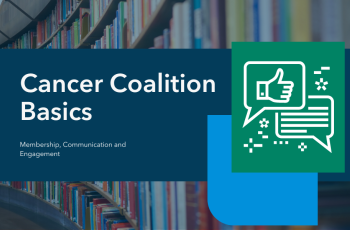This work was supported by Cooperative Agreement #NU58DP007539-01 from the Centers for Disease Control and Prevention (CDC).
Guidelines and Recommendations
This section of the Cancer Coalition Basics covers comprehensive cancer control coalition membership composition, process and engagement.
This Cancer Coalition Basics section covers tasks that take place during CCC plan development.
This Cancer Coalition Basics section covers different organizational, leadership, program and coalition staffing configurations for comprehensive cancer control organizations.
Get reliable information from the American Cancer Society to help educate yourself and your staff, and learn more about how the American Cancer Society is working to end health disparities and fight cancer around the world.
The National Cancer Survivorship Resource Center (The Survivorship Center) is a collaboration between the American Cancer Society (ACS), a CCC National Partner, and the George Washington University (GW) Cancer Institute funded by a 5-year cooperative agreement from the CDC. Its goal is to shape the…
This guide provides tips on adding more vegetables, fruits and whole grains to your diet while watching your refined carbohydrates, sugar, and fat intake.
A resource from the American Cancer Society to help patients know the signs and symptoms of colorectal cancer. Find out how colorectal cancer is tested for, diagnosed, and staged.
The American Cancer Society 2018 guideline for colorectal cancer screening recommends that average-risk adults aged 45 years and older undergo regular screening with either a high-sensitivity stool-based test or a structural (visual) exam, based on personal preferences and test availability. As a…
The National Cancer Survivorship Resource Center (The Survivorship Center) is a collaboration between the American Cancer Society and the George Washington University Cancer Institute funded by a 5-year cooperative agreement from the Centers for Disease Control and Prevention.
Public Health Institute's Berkeley Media Studies Group offers tips to help public health leaders communicate more clearly and effectively about COVID-19 vaccines, engage with trusted messengers and bring racial equity forward.


